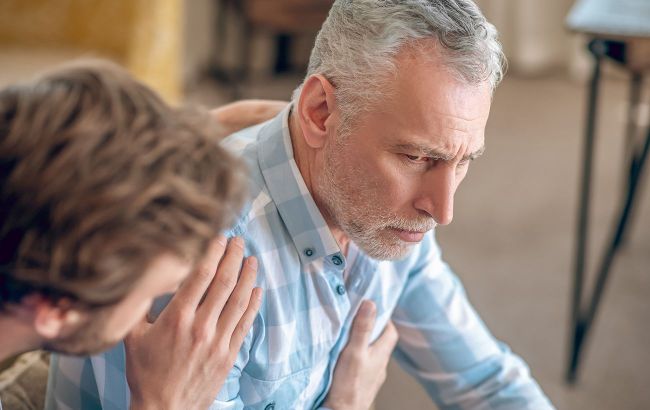Doctors name unexpected causes of heart attack
 Illustrative photo (Freepik)
Illustrative photo (Freepik)
Heart attacks and cardiovascular issues rank among the top health concerns and causes of premature death. Physicians worldwide are campaigning for responsible health practices and methods to keep the heart healthy.
Below is information on unexpected triggers for heart attacks, according to WebMD.
Lack of sleep
Regular sleep deprivation not only leaves you feeling irritable and tired but can also elevate the risk of a heart attack. In one study, researchers found that individuals who typically sleep less than 6 hours per day are twice as likely to suffer from a heart attack compared to those who sleep from 6 to 8 hours.
Doctors aren't precisely sure why this occurs, but they understand that sleep loss can increase blood pressure and lead to inflammation, neither of which is beneficial for the heart.
Migraines
People who experience migraines are at a higher risk of having a heart attack later in life compared to those who don't. And those with auras - strange visions, sounds, or sensations that precede the headache - may have a stronger connection to heart problems.
Cold weather
Cold is a shock to the system. Being outdoors in winter months can lead to arterial constriction, making it harder for blood to reach the heart. Additionally, your heart has to work harder to warm the body.
If this concerns you, be cautious in low temperatures and limit strenuous physical activity, such as shoveling snow.
Air pollution and vehicle emissions
Heart attacks are most prevalent in areas with high levels of air pollution. People regularly breathing dirty air are more prone to artery blockages and cardiovascular diseases. Sitting in traffic jams can be particularly dangerous as vehicle emissions combine with frustration or disappointment.
Heavy meals
Think twice before overeating, as your waistline isn't the only thing it harms. Consuming large amounts of food at once leads to increased levels of the stress hormone adrenaline in the body.
This can raise blood pressure and heart rate, and trigger heart attacks in some individuals. Very fatty foods can cause a sudden spike in blood fat levels, which can also temporarily damage some blood vessels.
Strong emotions, whether negative or positive
Anger, grief, and stress are known causes of heart problems, but joyful events can sometimes lead to heart attacks too. This could be triggered by the emotions accompanying a surprise birthday party, wedding, or the birth of a grandchild.
Sudden or intense exertion
Getting in shape protects your heart in the long run, but overdoing it can be dangerous. About 6% of heart attacks are caused by excessive physical exertion. And while you've probably heard that exercise is a good way to relieve stress, it's crucial not to overdo it when you're angry or upset.
Cold or flu
When your immune system fights off a virus, it can cause inflammation, which can damage the heart and arteries. According to one study, people with respiratory infections were twice as likely to have a heart attack. However, their risk returned to normal after they recovered from the infection. Heart attack rates are also higher during flu outbreaks, which is another significant reason to get a flu shot.
Asthma
Your chances of having a heart attack increase by about 70% if you have a lung disease. Even if you use an inhaler to keep it under control, your risk is still higher than normal. With asthma, you may also ignore feelings of tightness in the chest, which could be an early sign of a heart attack. Doctors don't know whether breathing problems cause heart attacks or if they're just a common factor: inflammation.
Disasters
Studies have shown that the frequency of heart attacks increases after major disasters such as earthquakes or terrorist attacks. And not just immediately afterward, but even years later. While you may not be able to avoid such situations, you can do something to cope with stress later, such as making sure you get enough rest and exercise.
Sex
Like many forms of physical activity, sexual activity is associated with an increased risk of a heart attack. But the risk here is very small, especially if you're in good physical shape and in good health. For most people, sex can and should be an important and healthy part of life. But reach out to your doctor if you have concerns.
Spectator sports
Engaging in sports can trigger a heart attack, as can watching sports competitions. In 2006, the number of heart attacks in Germany sharply increased during the national football team matches. And after the 1980 Super Bowl in Los Angeles, fatal heart attacks occurred following the "Rams" defeat.
Alcohol
Having one drink a day seems to protect your heart from disease, but excessive alcohol consumption can have the opposite effect. Over time, it can raise your blood pressure, increase levels of certain types of bad cholesterol, and lead to weight gain, all of which can harm your heart. There can also be short-term effects: according to one study, a binge drinking episode can increase the risk of a heart attack the following week.
Coffee
Like alcohol, coffee has its pros and cons. Caffeine temporarily raises blood pressure, which can trigger a heart attack, especially if you don't drink it regularly or are at risk for other reasons. However, overall, drinking one or two cups a day shouldn't be harmful.
Previously, we wrote about a condition often confused for a heart attack.
We also covered simple rules that can help prevent a heart attack.
This material is for informational purposes only and should not be used for medical diagnosis or self-treatment. Our goal is to provide readers with accurate information about symptoms, causes, and methods of detecting diseases. RBС-Ukraine is not responsible for any diagnoses that readers may make based on materials from the resource. We do not recommend self-treatment and advise consulting a doctor in case of any health concerns.

